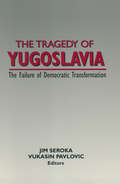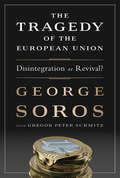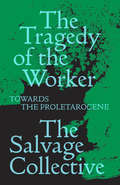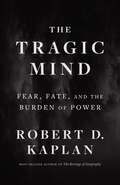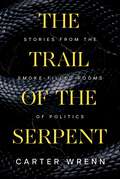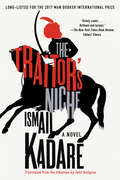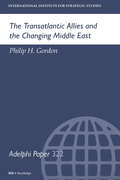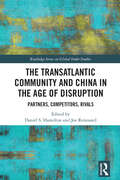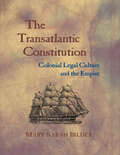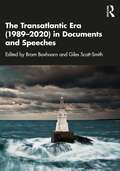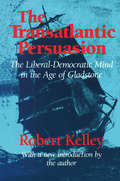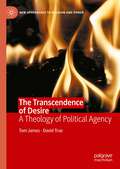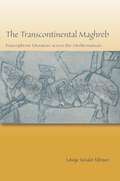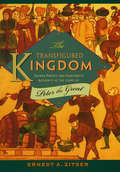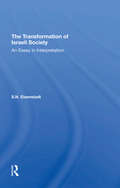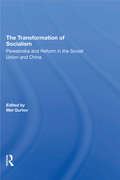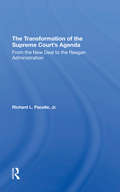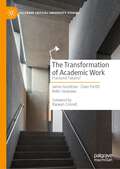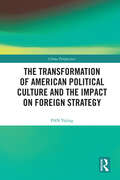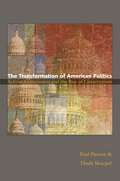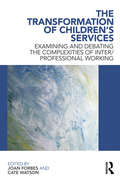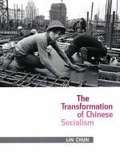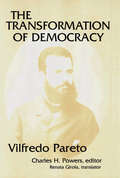- Table View
- List View
The Tragedy of Yugoslavia: The Failure of Democratic Transformation
by Jim Seroka Vukasin PavlovicOnce it was hoped that the Yugoslav federation might manage to defy the odds once more, this time to become one of the world's few examples of democratic pluralism. Instead, we are witnessing another Balkan tragedy. What went wrong? In this volume scholars from Croatia, Serbia, and Slovenia examine the Janus face of pluralism, with case studies of electoral politics in the republics and of what were once the country's institutions of integration - the League of Communists, the managerial elite, and the army. Among the contributors are Mirjana Kaspovic, Tomaz Masmak, Vesna Pusic, Anton Bebler, Ivan Siber, Vucina Vasovic, and the editors.
The Tragedy of the European Union: Disintegration or Revival?
by George Soros Gregor SchmitzThe European Union could soon be a thing of the past. Xenophobia is rampant and commonly reflected in elections across the continent. Great Britain may hold a referendum on whether to abandon the union altogether. Spurred by anti-EU sentiments due to the euro crisis, national interests conflict with a shared vision for the future of Europe. Is it too late to preserve the union that generated unprecedented peace for more than half a century?This is no mere academic question with limited importance for America and the rest of the world. In the past decade, the EU has declined from a unified global power to a fractious confederation of states with staggering unemployment resentfully seeking relief from a reluctant Germany. If the EU collapses and the former member states are transformed again from partners into rivals, the US and the world will confront the serious economic and political consequences that follow.In a series of revealing interviews conducted by Dr. Gregor Peter Schmitz, George Soros-a man of vast European experience whose personal past informs his present concerns-offers trenchant commentary and concise, prescriptive advice: The euro crisis was not an inevitable consequence of integration, but a result of avoidable mistakes in politics, economics, and finance; and excessive faith in the self-regulating financial markets that Soros calls market fundamentalism inspired flawed institutional structures that call out for reform. Despite the considerable perils of this period, George Soros maintains his faith in the European Union as a model of open society. This book is a testament to his vision for a peaceful and productive Europe.
The Tragedy of the Middle East
by Barry RubinAnalyzes the failures to establish direction in the Middle East
The Tragedy of the Worker: Towards the Proletarocene (Salvage Editions)
by Jamie AllinsonFacing irreversible climate change, the planet is en route to apocalypse To understand the scale of what faces us and how it ramifies through every corner of our lives is to marvel at our inaction. Why aren&’t we holding emergency meetings in every city, town and village every week? What is to be done to create a planet where a communist horizon offers a new dawn to replace our planetary twilight? What does it mean to be a communist after we have hit a climate tipping point? The Tragedy of the Worker is a brilliant, stringently argued pamphlet reflecting on capitalism&’s death drive, the left&’s complicated entanglements with fossil fuels, and the rising tide of fascism. In response, the authors propose Salvage Communism, a programme of restoration and reparation that must precede any luxury communism. They set out a new way to think about the Anthropocene. The Tragedy of the Worker demands an alternative future—the Proletarocene—one capable of repairing the ravages of capitalism and restoring the world.
The Tragic Mind: Fear, Fate, and the Burden of Power
by Robert D. KaplanA moving meditation on recent geopolitical crises, viewed through the lens of ancient and modern tragedy “Classical drama provides crucial lessons for policymakers. . . . A road map for effective, well-considered policy.”—Kirkus Reviews Some books emerge from a lifetime of hard-won knowledge. Robert D. Kaplan has learned, from a career spent reporting on wars, revolutions, and international politics in Europe, the Middle East, and East Asia, that the essence of geopolitics is tragedy. In The Tragic Mind, he employs the works of ancient Greek dramatists, Shakespeare, German philosophers, and the modern classics to explore the central subjects of international politics: order, disorder, rebellion, ambition, loyalty to family and state, violence, and the mistakes of power. The great dilemmas of international politics, he argues, are not posed by good versus evil—a clear and easy choice—but by contests of good versus good, where the choices are often searing, incompatible, and fraught with consequences. A deeply learned and deeply felt meditation on the importance of lived experience in conducting international relations, this is a book for everyone who wants a profound understanding of the tragic politics of our time.
The Trail of the Serpent: Stories from the Smoke-Filled Rooms of Politics
by Carter WrennPolitics is a mess—what&’s the cure?After living through WWII, Americans watched Soviet tanks roll into Saigon in 1975—we lost the Vietnam War. That changed politics. And Ronald Reagan was elected president. The Berlin Wall fell, the Soviet Union collapsed, we won the Cold War, threats vanished. That changed politics again. Washington politicians traded favors. Wall Street boomed. Working families staring at stacks of unpaid bills struggled to make ends meet. A reality TV star ran for president, won; coronavirus struck, Trump fumbled. Biden beat Trump. Politics is a mess—what&’s the cure? Carter Wrenn tells stories you don&’t often get to read about politics and politicians in The Trail of the Serpent.
The Traitor's Niche: A Novel
by Ismail Kadare"Kadare is inevitably linked to Orwell and Kundera, but he is a far deeper ironist than the first, and a better storyteller than the second. He is a compellingly ironic storyteller because he so brilliantly summons details that explode with symbolic reality." —The New YorkerAt the heart of the Ottoman Empire, in the main square of Constantinople, a niche is carved into ancient stone. Here, the sultan displays the severed heads of his adversaries. People flock to see the latest head and gossip about the state of the empire: the province of Albania is demanding independence again, and the niche awaits a new trophy . . . Tundj Hata, the imperial courier, is charged with transporting heads to the capital—a task he relishes and performs with fervor. As he travels through obscure and impoverished territories, he makes money from illicit side–shows, offering villagers the spectacle of death. The head of the rebellious Albanian governor would fetch a very high price indeed. The Traitor's Niche is a surreal tale of tyranny and rebellion, in a land where armies carry scarecrows, state officials ban entire languages, and the act of forgetting is more complicated than remembering.Long-listed for the 2017 Man Booker International Prize"The name of the Albanian novelist Ismail Kadare regularly comes up at Nobel Prize time, and he is still a good bet to win it one of these days . . . He is seemingly incapable of writing a book that fails to be interesting." —The New York Times
The Transatlantic Allies and the Changing Middle East (Adelphi series #322)
by Philip H GordonSince the mid-1990s, US and European attitudes, strategies and policies towards the Middle East have diverged. In the Middle East peace process, Europeans have grown frustrated with the lack of progress and with Washington’s near-monopoly on diplomatic action, and have begun to demand a greater role. On Iraq, the US insists on strong military and economic containment of Saddam Hussein, while some Europeans have started to press for a more rapid reintegration of Iraq into the international community and are reluctant to use or threaten force. The issue of how to deal with Iran has been most divisive of all, with the US and Europe deeply divided over whether they should contain, or engage, Tehran. Transatlantic tensions over the Middle East are damaging for three main reasons. They reduce the effectiveness of allied policies; undermine NATO’s cohesion when its future is no longer guaranteed by a common threat; and threaten to spill over into the economic domain. This paper examines the reasons for these potentially damaging differences, assesses the prospects for improving transatlantic cooperation in the region and suggests approaches that may help to bring this about. Its main policy conclusions are:On the Arab–Israeli conflict, as long as the peace process is moving forward, or has reasonable prospects of doing so, the US is probably right that Europe’s formal involvement in direct peace talks would not be helpful, particularly if such a role aimed to promote policies different from those of the US. If the peace process stalls completely, however, it will be difficult for Washington to justify opposing a more active European role. On Iraq, the US-led policy of containment is correct, and economic sanctions should remain in place until Baghdad complies fully with UN Security Council disarmament resolutions. However, in exchange for Europe’s agreement to contribute to Iraq’s military containment, the US, like Europe, should abide by the letter and spirit of these resolutions, even if this means agreeing to lift restrictions on oil exports if Iraq complies in full. Failing to do so could undermine global support for the integrity of the UN system, ultimately leaving the US, and perhaps the UK, isolated in maintaining a policy that might not be sustainable in the long term. On Iran, a transatlantic compromise would need to include an agreement by the US not to impose sanctions against European companies doing business with Iran, as long as Europe offered unstinting support in combating terrorism and helping to contain the development of weapons of mass destruction. The US should also seek agreement with the European Union on which Iranian actions would justify sanctions or other punitive measures.The paper concludes by examining institutional changes that might help to promote transatlantic cooperation on the Middle East.
The Transatlantic Community and China in the Age of Disruption: Partners, Competitors, Rivals (Routledge Series on Global Order Studies)
by Joe Renouard Daniel S. HamiltonThis volume analyzes what China’s rise means for the transatlantic community in a new age of disruption—an age marked by great power rivalry, technological upheavals, and the diffusion of power.The book explores how today’s conditions—including heightened Western concerns about Chinese influence operations, Chinese efforts to manipulate critical economic interconnections and dependencies, rapid technological advances, the Russia–China entente, and growing linkages between North Atlantic and Indo-Pacif ic security—have forced Western actors to adopt a more differentiated approach. In this great power competition, they must decide how and where to work with China as an important partner, how to address China’s competitive challenges, and how to address China’s efforts to forge a set of norms and institutions to challenge the open, rules-based international system.The book will be of key interest to students and scholars of Transatlantic Relations, International Relations, Global Governance, European Politics, Asian Security, US and EU Foreign Policy, and Sino-Western relations. It will also be of interest to think-tank researchers and policy practitioners.
The Transatlantic Constitution: Colonial Legal Culture and the Empire
by Mary Sarah Bilder“One of the more significant recent pieces of scholarship in this area . . . essential reading for all students of early America.” —Journal of American History Departing from traditional approaches to colonial legal history, Mary Sarah Bilder argues that American law and legal culture developed within the framework of an evolving, unwritten transatlantic constitution that lawyers, legislators, and litigants on both sides of the Atlantic understood. The central tenet of this constitution—that colonial laws and customs could not be repugnant to the laws of England but could diverge for local circumstances—shaped the legal development of the colonial world.Focusing on practices rather than doctrines, Bilder describes how the pragmatic and flexible conversation about this constitution shaped colonial law: the development of the legal profession; the place of English law in the colonies; the existence of equity courts and legislative equitable relief; property rights for women and inheritance laws; commercial law and currency reform; and laws governing religious establishment. Using as a case study the corporate colony of Rhode Island, which had the largest number of appeals of any mainland colony to the English Privy Council, she reconstructs a largely unknown world of pre-Constitutional legal culture.“The book is rich in social history as well, with the evolving status of women and institutional religion providing much of the legal grist.” —Choice
The Transatlantic Era (1989–2020) in Documents and Speeches
by Bram BoxhoornThis accessible textbook uses key documents embedded in a clear narrative to chart the post-Cold War rise and decline of transatlantic relations. It provides a novel interpretive framework by proposing that the three decades between 1989 and 2020 represent a distinct ‘transatlantic era’. Providing a unique new look at the recent history and politics of transatlantic relations, the book argues that three key phases can be identified: 1989–1999: victory? 2000–2010: divergence? 2011–2020: disarray? Each period defines a particular set of political, economic, and security dynamics, with the trend being a gradual undermining of the strengths on which transatlantic unity once relied. These three decades therefore represent both the high point of the transatlantic region’s power and potential, and its gradual decline in a global context. Presenting students with a critical perspective of US and European transatlantic policies through annotated key documents covering central aspects of security, political, economic, and cultural affairs, it will be essential reading on all International Relations courses as well as of great interest to scholars and students of US and European Studies, Foreign Policy, and Security Studies.
The Transatlantic Persuasion: Liberal-Democratic Mind in the Age of Gladstone
by Robert KelleyThis pioneering work is the basic and largely unmatched study of the single transatlantic community of thought shared by nineteenth century British and Canadian Liberals and American Democrats. The result of more than ten years of comparative research, The Transatlantic Persuasion explores the roots of those ideas that comprise a coherent Liberal-Democratic worldview: ideas about society, human relations, the economy, equality, liberty, the ethnocultural dimension of life, the proper role and nature of government and the world community.
The Transcendence of Desire: A Theology of Political Agency (New Approaches to Religion and Power)
by Tom James David TrueThe “secular age” is not a smooth, untroubled process of accumulation and advance but an uneven and unpredictable series of clashes of interest. Charles Taylor’s “immanent frame” cannot be construed merely as a phenomenon within religion and culture but urgently needs to be understood in political and economic terms–i.e., as a class project. The failure of the secular, vividly displayed in the crumbling legitimacy of global institutions and in the spectacle of police violence, both calls for and makes possible a renewal of political agency. Tom James and David True argue that a theology of the cross has a distinctive potential today: it can pierce the sacred aura of normalcy around the consensual anti-politics of the neoliberal order so that a vision of a world beyond today’s racialized capitalism can emerge. But they contend that we don’t need to forsake the emancipatory aims of modernity nor retreat to local communities. As an alternative to these weak strategies, they offer a constructive and cruciform account of political agency that includes both prophetic resistance and practical wisdom, each embedded in contemporary struggles for freedom that, they argue, embody divine desire for a common world.
The Transcontinental Maghreb: Francophone Literature across the Mediterranean
by Edwige Tamalet TalbayevThe writer Gabriel Audisio once called the Mediterranean a “liquid continent.” Taking up the challenge issued by Audisio’s phrase, Edwige Tamalet Talbayev insists that we understand the region on both sides of the Mediterranean through a “transcontinental” heuristic. Rather than merely read the Maghreb in the context of its European colonizers from across the Mediterranean, Talbayev compellingly argues for a transmaritime deployment of the Maghreb across the multiple Mediterranean sites to which it has been materially and culturally bound for millennia.The Transcontinental Maghreb reveals these Mediterranean imaginaries to intersect with Maghrebi claims to an inclusive, democratic national ideal yet to be realized. Through a sustained reflection on allegory and critical melancholia, the book shows how the Mediterranean decenters postcolonial nation-building projects and mediates the nomadic subject’s reinsertion into a national collective respectful of heterogeneity. In engaging the space of the sea, the hybridity it produces, and the way it has shaped such historical dynamics as globalization, imperialism, decolonization, and nationalism, the book rethinks the very nature of postcolonial histories and identities along its shores.
The Transfigured Kingdom: Sacred Parody and Charismatic Authority at the Court of Peter the Great (Studies of the Harriman Institute)
by Ernest A. ZitserIn this richly comparative analysis of late Muscovite and early Imperial court culture, Ernest A. Zitser provides a corrective to the secular bias of the scholarly literature about the reforms of Peter the Great. Zitser demonstrates that the tsar's supposedly "secularizing" reforms rested on a fundamentally religious conception of his personal political mission. In particular, Zitser shows that the carnivalesque (and often obscene) activities of the so-called Most Comical All-Drunken Council served as a type of Baroque political sacrament—a monarchical rite of power that elevated the tsar's person above normal men, guaranteed his prerogative over church affairs, and bound the participants into a community of believers in his God-given authority ("charisma"). The author suggests that by implicating Peter's "royal priesthood" in taboo-breaking, libertine ceremonies, the organizers of such "sacred parodies" inducted select members of the Russian political elite into a new system of distinctions between nobility and baseness, sacrality and profanity, tradition and modernity.Tracing the ways in which the tsar and his courtiers appropriated aspects of Muscovite and European traditions to suit their needs and aspirations, The Transfigured Kingdom offers one of the first discussions of the gendered nature of political power at the court of Russia's self-proclaimed "Father of the Fatherland" and reveals the role of symbolism, myth, and ritual in shaping political order in early modern Europe.
The Transformation Of Israeli Society: An Essay In Interpretation
by S. N. Eisenstadt S N EisenstadtThis book discusses the development and organization of the major spheres of life of Israeli society. It analyses major aspects and trends of development of Israeli society which have been taking place continuously since its beginning, from the early period of Zionist settlement in Eretz Israel.
The Transformation Of Socialism: Perestroika And Reform In The Soviet Union And China
by Melvin GurtovThis book is based on Conference on the Transformation of Socialism in the Soviet Union and China, and reveals a second feature of the conference: the candor of the presentations. It discusses the effects of the reforms on political processes and the development of socialism.
The Transformation Of The Supreme Court's Agenda: From The New Deal To The Reagan Administration
by Richard PacelleWhen we think of judicial activism–the Court's role in making public policy–we often focus on individuals: the Robert Borks or Thurgood Marshalls of the times. In this book, Richard Pacelle explores the institutional judicial activism of the Supreme Court through the dramatic changes in its agenda as it has evolved from 1933 to the present. Once dominated by economic issues, the Supreme Court's agenda is now populated largely by cases involving individual rights and liberties. This shift is hardly accidental, Pacelle argues, and he offers quantitative as well as qualitative assessments of the means and motivations for change. Over 7,500 cases serve as the basis of analysis, and the narrative is amplified by informative appendixes: an explanation of the author's case taxonomy, a chronology of the Court's chief justices, a list of cases cited, and a digest of key cases. The systematic framework provided for tracing historical changes in the Supreme Court's agenda is the first of its kind and is sure to be valuable in future analyses and projections of coming change beyond the Rehnquist Court.
The Transformation of Academic Work: Fractured Futures? (Palgrave Critical University Studies)
by James Goodman Keiko Yasukawa Claire ParfittThis book offers a unique grounded analysis of recent crises and transformations in academic work. It charts international and Australia-based efforts to overcome academic fragmentation and precarity, and to advance agendas for the public university. It is based on extensive qualitative interviews with academics and managers across several universities in Australia. It finds new grounds for ‘universal’ universities, with decent jobs, to serve the public good. The book is aimed at students and scholars from sociology, education, politics and industrial relations, and a wider readership concerned about the future of universities. Analysis centres on a trade union-led initiative in Australia aimed at decasualising universities, and ensuing debates about the impact of academic fragmentation. The authors argue for strengthening the teaching/research nexus as the foundation-stone for public purpose universities.
The Transformation of American International Power in the 1970s
by Barbara ZanchettaBarbara Zanchetta analyzes the evolution of American-Soviet relations during the 1970s, from the rise of détente during the Nixon administration to the policy's crisis and fall during the final years of the Carter presidency. This study traces lines of continuity among the Nixon, Ford, and Carter administrations and assesses its effects on the ongoing redefinition of America's international role in the post-Vietnam era. Against the background of superpower cooperation in arms control, Dr. Zanchetta analyzes aspects of the global bipolar competition, including U. S. -China relations, the turmoil in Iran and Afghanistan, and the crises in Angola and the Horn of Africa. In doing so, she unveils both the successful transformation of American international power during the 1970s and its long-term problematic legacy.
The Transformation of American Political Culture and the Impact on Foreign Strategy (China Perspectives)
by PAN YalingThis book examines the interplay between political culture and diplomatic strategy in the U.S., revealing the transformation of American political culture and its impact on the country's foreign strategy. The theoretical pivot of this study is an analysis of the dynamics of political culture and the mechanisms of the interaction between political culture and diplomatic strategy. Given this premise, the core chapters revisit the historical transformations of American political culture and analyze the responses and countermeasures taken to attempt to reverse the perceived decline in American hegemony during the presidencies of George W. Bush, Barack Obama, and Donald Trump, factors interwoven with security, economic, and institutional crises. The discussion describes the landscape and evolution of contemporary American political culture and the correlated adjustments of U.S. global strategy over the course of the twenty first century. Given the myriad of challenges and political legacies left by its predecessors, the author gives a pessimistic prognosis of the prospect of resolving America's political plight by the Joe Biden administration. The title will be a valuable reference for academic and general readers interested in American politics, U.S. diplomatic strategy, and international relations.
The Transformation of American Politics: Activist Government and the Rise of Conservatism (Princeton Studies in American Politics: Historical, International, and Comparative Perspectives #94)
by Paul Pierson and Theda SkocpolThe contemporary American political landscape has been marked by two paradoxical transformations: the emergence after 1960 of an increasingly activist state, and the rise of an assertive and politically powerful conservatism that strongly opposes activist government. Leading young scholars take up these issues in The Transformation of American Politics. Arguing that even conservative administrations have become more deeply involved in managing our economy and social choices, they examine why our political system nevertheless has grown divided as never before over the extent to which government should involve itself in our lives. The contributors show how these two closely linked trends have influenced the reform and running of political institutions, patterns of civic engagement, and capacities for partisan mobilization--and fueled ever-heightening conflicts over the contours and reach of public policy. These transformations not only redefined who participates in American politics and how they do so, but altered the substance of political conflicts and the capacities of rival interests to succeed. Representing both an important analysis of American politics and an innovative contribution to the study of long-term political change, this pioneering volume reveals how partisan discourse and the relationship between citizens and their government have been redrawn and complicated by increased government programs. The contributors are Andrea Louise Campbell, Jacob S. Hacker, Nolan McCarty, Suzanne Mettler, Paul Pierson, Theda Skocpol, Mark A. Smith, Steven M. Teles, and Julian E. Zelizer.
The Transformation of Children's Services: Examining and debating the complexities of inter/professional working
by Cate Watson Joan ForbesCan we imagine different ways of working together to secure better outcomes for children and families? What are the complex issues that underlie the apparently simple call for ‘joined-up’ services? Children’s services in many countries around the world are being transformed as part of the call for ‘joined-up working for joined-up solutions’. Social, health and educational policy discourses are driven by the idea that ‘effective’ inter/professional, interagency collaboration is crucial in determining whether service delivery to children and families will succeed or fail. However, the rapid turn from previous inter/professional practices of liaison, consultancy, cooperation and collaboration to more radical and wholescale service integration and sector transformation has not been accompanied either by a well considered research agenda of hard questions nor close scrutiny of its effects and consequences. The book asks a series of searching and challenging questions: What are the complex issues involved in children’s sector transformation for all those involved – young people, practitioners, leaders and managers, policy makers? How can the ‘silos’ in which professionals have traditionally been prepared for practice be broken down? What are the orthodoxies that surround ‘joined-up’ working and in what ways should they be challenged? Written by authors from across the wide range of professional, policy and disciplinary groups involved in this new cross-cutting area of policy and practice, this book provides a critical analysis of the complexities of children’s services transformations. The research in this collection addresses the range of discursive, policy and organizational developments associated with the transformation of children’s services, providing an important and timely analysis of their complexities and is essential reading for all those working in the complex spaces of children’s services.
The Transformation of Chinese Socialism
by Chun LinIn this significant contribution to both political theory and China studies, Lin Chun provides a critical assessment of the scope and limits of socialist experiments in China, analyzing their development since the victory of the Chinese communist revolution in 1949 and reflecting on the country's likely paths into the future. Lin suggests that China's twentieth-century trajectory be grasped in terms of the collective search by its people for a modern alternative to colonial modernity, bureaucratic socialism, and capitalist subordination. Evaluating contending interpretations of the formation and transformation of Chinese socialism in the contemporary conditions of global capitalism, Lin argues that the post-Mao reform model must be remade.
The Transformation of Democracy
by Robert KelleyCombining a thorough introduction to the work of nineteenth and early twentieth-century Italian social theo-rist Vilfredo Pareto with a highly read-able English translation of Pareto's last monograph, "Generalizations," origi-nally published in 1920, this work illus-trates precisely how and why demo-cratic forms of government undergo decay and are eventually re-invigo-rated. More than any other social scien-tist of his generation, Pareto offers a well-developed, articulate, and com-pelling theory of change based on a Newtonian vision of science and an en-gineering model of social equilibrium.In his introduction, Powers focusses on Pareto's intellectual maturation and on his overall theory of society. Powers describes the various stages of Pareto's development as engineer, economist, political scientist, and finally as sociol-ogist. He explains how Pareto consid-ered himself the Einstein of social sci-ence and how he introduced the con-cept of relativity into the social sci-ences. Even if such self-claims were rarely widely shared, the sense of Pareto's originality is doubted by few, if any, contemporary scholars. This last, and in many ways most penetrat-ing, of Pareto's briefer works, warns of the dangers which can befall demo-cratic order. It is important because, as his final attempt to clarify his ideas, it places his earlier works in perspective. Pareto generates a comprehensive the-ory of complex social phenomena.
